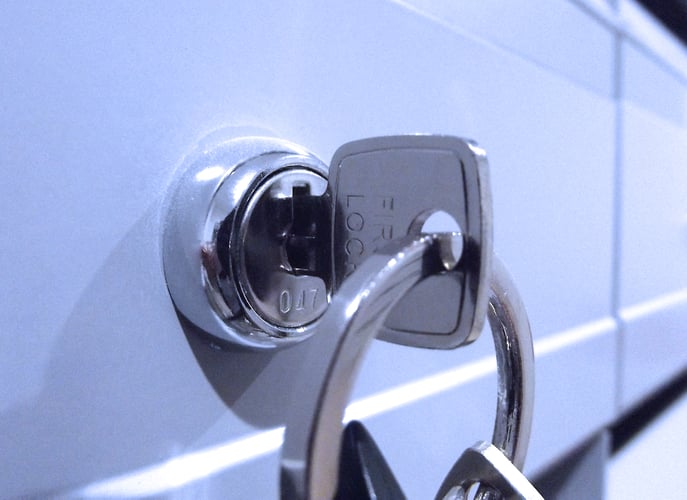Key Control: The Role of Restricted Keyways

One of the top concerns of any organization is security. Protecting your people, financial assets, inventory, and proprietary information, as well as regulating who has access, is a number one priority.
Having a robust key management system is part of your overall security, but so are the locks and keys themselves. Some keyways provide tighter security than others. In this article, we will explain what a restricted keyway is and the role they play in a key control program.
What Is a Restricted Keyway?
Restricted keyways can be differentiated from standard keyways by one specific feature. Standard keyways use a common key shape and groove pattern that can easily be duplicated. The design of a restricted keyway typically involves using a unique key shape or groove pattern that is not commonly available or widely distributed, making it difficult for unauthorized individuals to pick or duplicate the key. Additionally, the key blank for a restricted keyway may be restricted to only certain locksmiths or dealers, further limiting access to the key and making it harder to duplicate. They're often used by high-security organizations like government facilities, banks, and other environments where strict access control is needed.
The serialization of restricted keys adds another layer of security and accountability. Each key is marked with a unique serial number, which is used to track the key for its entire life. This serial number is used to track which organization owns the key, how it's cut, what it opens, and who the key is assigned to. Key serial numbers make record keeping simpler and more accurate when paired with the right key tracking software.
Read more about the difference between restricted keyways and standard keyways.
Why Should Restricted Keyways Be Part of a Key Control Program?
Any organization that needs a higher level of security to protect their assets should consider using a restricted keyway as part of their key control program. They provide an additional layer of security and control over access to facilities, assets, or information. There are several reasons why an organization might choose to use restricted keyways. Here are three ways restricted keyways can benefit a key control program:
No Unauthorized Duplication
The single most important benefit of using restricted keyways in a key control system is the prevention of unauthorized duplicate keys. Since a standard keyway makes use of common key blanks and groove patterns, it's not too difficult to take a key and have a duplicate made without permission. With restricted keyways, the unique blanks and groove patterns are specific to one dealer or locksmith and can only be duplicated by that entity. This prevents unauthorized individuals from copying a key and gaining access to an area they shouldn't be in.
Enhanced Security
The unique key blanks and groove patterns of a restricted keyway have the added benefit of making their respective locks more difficult to pick or manipulate. This makes them more secure when used in a key control program when compared to standard keyways, which rely on common blanks and groove patterns that would be more familiar to someone trying to manipulate a lock.
Better Key Control
The ultimate goal of an organization's key control program is to ensure that all keys are accounted for and issued only to authorized individuals. In other words, the right keys are in the hands of the right people. With restricted keyways, the appropriate key blanks can only be provided by an authorized dealer, making it much easier to prevent unauthorized key duplication and ensuring that only authorized individuals have access to the keys.
Replacing your current lock and key system with a restricted keyway may seem like a daunting task, but the benefits it brings to your organization's security and organization are well worth the effort. A qualified key system vendor can simplify the process for your business.
If you’re looking to improve your key control program, you can learn more about restricted, serialized keyways here to see if they fit your organization.




